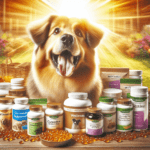
If you’ve ever found yourself wondering, “Why is my dog aggressive towards other dogs and how can canine health products help?” you’re not alone. Many dog owners face this challenging behavior, which can stem from a variety of causes, including breed-specific traits, lack of socialization, or underlying health issues. By understanding these triggers and addressing any potential health concerns with the right canine wellness supplements, you can help support your dog’s overall well-being and reduce aggressive tendencies. Products like omega-3 fatty acids for healthy skin, glucosamine for joint health, and probiotics for digestive wellness can play a significant role in maintaining a balanced and calm demeanor in your furry friend. Always consult with your veterinarian to ensure you’re giving your dog the best possible care tailored to their specific needs. Why is my dog aggressive towards other dogs? You’re certainly not alone if you’ve asked this question! Many dog owners face this challenging situation, and it can be quite distressing. Understanding why your dog might be displaying aggressive behavior towards other dogs is crucial for finding the appropriate solutions. Furthermore, canine health products can play a significant role in managing and reducing such behavior. Let’s dive into some of the common causes and explore how specific health products and supplements can help your furry friend lead a calmer, happier life.

Understanding Canine Aggression
What is Canine Aggression?
Canine aggression is a range of behaviors that dogs may exhibit out of fear, territoriality, reaction to pain, or many other reasons. It could manifest as barking, lunging, growling, or even biting other dogs. Understanding these behaviors requires paying attention to what triggers them and how frequently they occur.
Common Reasons for Dog Aggression
Inspecting the root cause of your dog’s aggression can help you in managing it effectively. Some common reasons include:
- Fear or Anxiety: Dogs may act aggressively when they feel threatened or scared.
- Territorial Behavior: Some dogs are naturally territorial and may react aggressively to other dogs entering their space.
- Lack of Socialization: Dogs who haven’t been socialized properly might react aggressively to unfamiliar canine companionship.
- Health Issues: Sometimes, health problems can lead to irritability and aggression. For example, your dog could be in pain due to joint issues or dental problems.
The Role of Canine Health Products
Health products can be a game-changer in managing your dog’s aggressive behavior. High-quality supplements, vitamins, and other health aids can make a significant difference in your dog’s overall well-being and behavior.
How Health Products Improve Canine Well-being
Health supplements can offer a balanced mix of essential nutrients that may help in addressing underlying health issues contributing to aggressive behavior. For instance:
- Joint Supplements: Products containing glucosamine and chondroitin can help with joint health, reducing pain and discomfort.
- Skin and Coat Supplements: Omega-3 fatty acids aid in maintaining healthy skin and coat, reducing discomfort that could lead to irritability.
- Digestive Health: Probiotics and digestive enzymes can improve gut health, resulting in overall better wellness and mood.
Popular Canine Health Products
Let’s take a closer look at some of the most popular health products that can help manage aggression in dogs:
| Product Type | Benefits | Example Ingredients |
|---|---|---|
| Joint Health Supplements | Reduces pain and promotes joint mobility | Glucosamine, Chondroitin |
| Skin and Coat Supplements | Improves skin health and reduces irritation | Omega-3 Fatty Acids |
| Probiotics and Digestive Aids | Enhances gut health and strengthens immunity | Probiotics, Digestive Enzymes |
| Multivitamins | Provides a balanced mix of essential nutrients | Various vitamins and minerals |

Specific Supplements to Consider
Joint Health Supplements
Joint pain can be a major source of irritability and aggression in dogs. Joint supplements containing glucosamine and chondroitin can help improve your dog’s joint health, making them more comfortable and less likely to act out aggressively.
Skin and Coat Supplements
Omega-3 fatty acids play an essential role in maintaining healthy skin and a shiny coat. These supplements can also help reduce inflammation, which can alleviate discomfort and irritability.
Digestive Health Supplements
Digestive health is closely tied to overall well-being. Probiotics and digestive enzymes can improve your dog’s gut health, leading to better nutrient absorption and a more balanced mood.
Multivitamins
A lack of essential nutrients can adversely affect your dog’s mood and behavior. Multivitamins offer a comprehensive mix of vitamins and minerals that support overall health and well-being.
How to Choose the Best Canine Health Products
Consult Your Veterinarian
Before introducing any new supplements into your dog’s diet, it’s essential to consult with your veterinarian. They can provide the best advice tailored to your dog’s specific needs.
Look for NASC Quality Seal
The National Animal Supplement Council (NASC) Seal indicates that the product has undergone rigorous quality assurance checks. Products with this seal are more likely to be effective and safe.
Read Labels Carefully
Ensure that the supplements contain high-quality, natural ingredients. Avoid products with artificial fillers, preservatives, or low-quality ingredients.
Start Slowly
When introducing new supplements, start with smaller doses and gradually increase them as your dog gets used to the new addition. This helps in monitoring any adverse reactions or side effects.

Additional Tips for Managing Dog Aggression
Training and Socialization
Professional training can help your dog learn to interact more positively with other dogs. Socialization is also crucial; introducing your dog to different environments and other dogs in a controlled manner can significantly reduce aggressive tendencies.
Exercise Regularly
Regular physical activity can help reduce stress and anxiety in dogs, making them less likely to exhibit aggressive behavior. Aim for at least 30 minutes to an hour of exercise daily.
Provide Mental Stimulation
Mental challenges can keep your dog engaged and less likely to act out aggressively. Puzzle toys, training exercises, and interactive games can be excellent ways to stimulate your dog mentally.
Balanced Diet
A balanced diet rich in essential nutrients is critical for your dog’s overall health and well-being. Consult with your veterinarian to ensure your dog is receiving the right type of food.
Regular Check-ups
Regular veterinary check-ups can help catch any health issues early on before they contribute to behavioral problems. Annual or bi-annual check-ups are recommended to keep your dog in optimal health.
Avoid Trigger Situations
Observe what situations trigger your dog’s aggressive behavior and try to avoid or manage these situations better. For example, if your dog becomes aggressive around other dogs during walks, consider walking them at quieter times or in less populated areas.
FAQs
How do I know if my dog’s aggression is due to a health issue?
Frequent veterinary check-ups and consultations can help determine if there is an underlying health issue contributing to your dog’s aggression. Look for signs like limping, changes in eating or drinking habits, or visible pain.
Can supplements replace medication for aggression?
Supplements are not a replacement for prescribed medication but can work alongside them to improve overall health and reduce symptoms. Always consult with your veterinarian before making any changes to your dog’s treatment plan.
Are natural remedies effective for canine aggression?
Natural remedies can be effective but vary from dog to dog. Many pet owners find success using a combination of natural supplements and behavioral training to manage aggression.
How long does it take for supplements to show results?
It can take a few weeks to a couple of months to see noticeable changes in your dog’s behavior after introducing supplements. Consistency is key to observing the full benefits.
Are there any side effects to using health supplements for dogs?
While generally safe, some dogs may experience mild side effects like digestive upset when starting new supplements. Start with a low dose and consult your veterinarian to minimize any risks.
Conclusion
Understanding why your dog is aggressive towards other dogs and finding effective solutions can improve not only your dog’s quality of life but also your own. By focusing on overall health and well-being through the use of quality canine health products, regular veterinary care, and consistent training, you can help your furry friend become a happier, less aggressive companion. Always consult with your veterinarian for the best course of action tailored to your dog’s specific needs. Your commitment to your dog’s health and well-being can pave the way for a more harmonious relationship and a more peaceful household.







